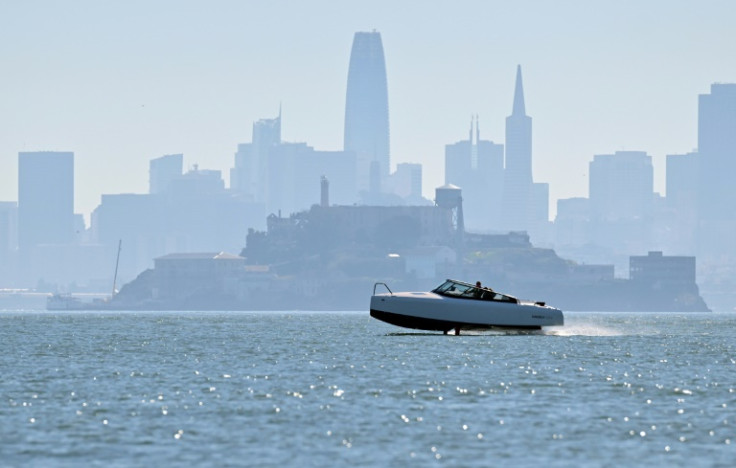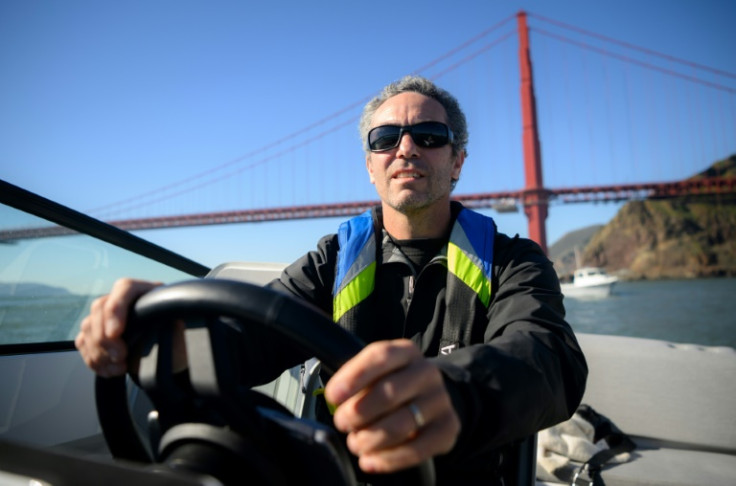Electric Boat Goes Airborne For Cleaner Ocean Voyage

Appearing at a glance to be just a simple pleasure boat floating on the San Francisco Bay, as the hydrofoil-equipped vessel picks up speed it suddenly begins rising above the water, grabbing the attention of passengers on a nearby ferry.
But instead of a roaring engine thrusting the boat along, its electric motor barely makes a sound.
Such electric boats with computer-guided hydrofoils may soon supplant conventional ferries with combustion engines in harbors and bays around the world, if Swedish "flying boat" maker Candela has its way.
"It's half plane and half boat; almost like riding a magic carpet," French sailor Tanguy de Lamotte said from the helm of the 8.5-meter (28-foot) long C8.
De Lamotte, who has completed the Vendee Globe solo round-the-world race in a sailboat twice as large as the C8, heads Candela's US arm.
The Swedish company's goal is to make the most energy-efficient electric boats "and get away from fossil fuels," according to de Lamotte.
Hydrofoils that act as underwater wings lift the boat as it accelerates, leaving only the rotor and hydrofoils immersed and greatly reducing friction.
In addition to using some 80 percent less energy to travel, the boat also avoids nausea-causing waves or swells, de Lamotte said.
And since the engine is electric, passengers are spared the noise and smell of gas-powered motors.
Candela has received some 150 orders for the C8, which has a starting price of $400,000. The first delivery is expected to arrive in Florida by the end of the month.
While the project may seem like a drop in the ocean when it comes to countering climate change-inducing fossil fuel emissions, it is at least an oar stroke in the right direction, Lamotte contended.
Even if the C8 is a hit, their environmental benefit would be limited since recreational boats tend to be used only a couple of days a week and when weather is pleasant.
So Candela wants to tackle ferries. Their next model is a catamaran with 25 seats to be tested as a shuttle in the Stockholm archipelago later this year, he said.
The service is expected to cut in half the amount of time it takes people using ferries or buses to get from the Ekero suburb to the city center once it gets going.
The company also plans to test its P8 craft -- a "limousine" version of the C8 -- between the airport and hotels in Venice, Italy.
For now, electric motors combined with hydrofoils are far from being viable in massive container ships or cruise ships.
And, the issue of producing batteries and recycling the materials remains a hindrance in the industry.
"The solution of our environmental problem is going to come with technology," de Lamotte told AFP aboard the C8.
"That is what we are trying to do; for sure the impact is way less than what we are using these days with internal combustion engines."
Candela touts the C8 as the "fastest" and "longest-range" electric boat on the market, traveling as far as 57 nautical miles (about 100 kilometers) on a single charge with an average speed of 22 knots and peak at 30 knots.
According to an Allied Market Research report published last year, the electric boat market was worth $5 billion in 2021 and will exceed $16 billion by 2031.
Candela seeks to differentiate itself with hydrofoils and an advanced computer that automatically adjusts them to keep voyages smooth and safe.
"Designing an electric boat is easy enough," said de Lamotte, who was working on his own prototype when hired by the Swedish company.
"Making it fly by itself is more complicated."
French entrepreneur Alexei Chemenda said he and his wife "fell in love" with the Candela flying boat after spotting an older model in the San Francisco Bay last year and giving one a try.
The couple plans to have a C8 delivered to Cannes, where they have a house, and where they plan to rent it.
"It's magical. The boat rises, the wake disappears and you feel like you are floating."


© Copyright AFP 2024. All rights reserved.





















